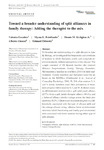Toward a Broader Understanding of Split Alliances in Family Therapy: Adding the Therapist to the Mix

Use this link to cite
http://hdl.handle.net/2183/31023
Except where otherwise noted, this item's license is described as Atribución-NoComercial-SinDerivadas 4.0 Internacional
Collections
- Investigación (FEP) [507]
Metadata
Show full item recordTitle
Toward a Broader Understanding of Split Alliances in Family Therapy: Adding the Therapist to the MixDate
2022-03Citation
Escudero, V., Friedlander, M. L., Kivlighan, D. M., Abascal, A., & Orlowski, E. (2022). Toward a broader understanding of split alliances in family therapy: Adding the therapist to the mix. Family Process, 61, 167– 182. https://doi.org/10.1111/famp.12718
Abstract
[Abstract] To broaden our understanding of a split alliance in fam-ily therapy, we investigated the frequencies and correlates of sessions in which therapists, youth, and caregivers re-ported markedly different perceptions of the alliance. The sample consisted of 156 Spanish families who received Alliance Empowerment Family Therapy (Escudero, Adolescentes y familias en conf licto, 2013) for child mal-treatment. Family members and therapists rated the al-liance on the SOFTA-s (Friedlander et al., Journal of Counseling Psychology, 2006, 53, 214) after sessions 3, 6, and 9; family members rated their perceptions of treat-ment progress before sessions 4, 7, and 10. A cluster analy-sis differentiated sessions with a split adult- youth alliance(27.7%) from a split family- therapist alliance (44.1%), and a balanced alliance (similar ratings across the three per-spectives; 28.2%). Client- rated treatment progress was dif-ferentially associated with the type of alliance split and the average alliance rating, whereas better posttreatment outcomes (child functioning and family goal attainment) were associated with fewer sessions having either type of split alliance
Keywords
Therapeutic alliance
Split alliance
SOFTA
Child maltreatment
Family Therapy Process
Alianza terapéutica
Alianza dividida
Maltrato infantil
Terapia de familia
Split alliance
SOFTA
Child maltreatment
Family Therapy Process
Alianza terapéutica
Alianza dividida
Maltrato infantil
Terapia de familia
Description
Financiado para publicación en acceso aberto: Universidade da Coruña/CISUG
Editor version
Rights
Atribución-NoComercial-SinDerivadas 4.0 Internacional






